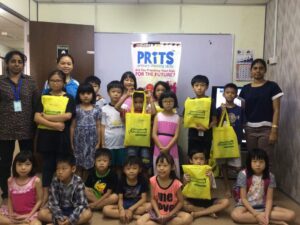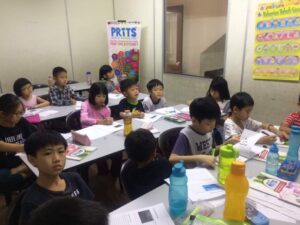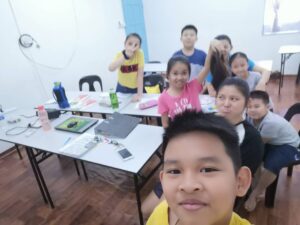PRITS
Ages: 7-12
Cultivate Practical Thinking Skills For Your School-Going Children

In the new AI era, teaching young children how to think is crucial. AI is integrated into our lives, and children need skills to navigate and thrive. Here’s why it’s important:
Critical Thinking: Children learn to question and analyze AI-generated information, helping them make informed decisions and challenge biases.
Problem-Solving: Teaching children to think beyond AI capabilities fosters creativity, resourcefulness, and innovative solutions.
Ethical Considerations: They develop an understanding of AI ethics, including privacy, bias, and fairness, making responsible choices aligned with their values.
Adaptability and Learning: Thinking skills cultivate adaptability, resilience, and a thirst for lifelong learning in a rapidly evolving technological world.
Collaboration and Human Interaction: Children gain social and emotional intelligence, empathy, and collaboration skills, essential for complex human interactions AI cannot replicate.
By teaching children how to think, we prepare them to be responsible users, creative problem-solvers, and contributors in an AI-driven society.
7 to 12 Years Old

Thinking Skills Designed For Primary School Students To Enable Them To Use Higher Order Thinking Skills (HOTS) In Helping Them To Cope With Their School Lessons Which Required Them To Think And Give Their Personal Input!

Better thinking simulation, better brain’s Neuron Connections!
15 minutes instant results! in helping primary school going children to have new thinking abilities!
Our PRiTS Master Trainer, Mr. K.W. Chin conducted an Immediate Results Test designed by Dr. Hooi to a group of 18 students. Each student needs to answer a simple question before the start of a PRiTS session. Each student are shown a picture of a crying baby. They were asked to write anything they can think of from the picture. A few minutes later, all of them gave the same answer. ‘A baby is crying’*.
After Mr. Chin conducted a PRiTS lesson to each of them, all of them are able to have new neuron connection and connect the crying baby to various reasons for their crying, locations the baby is crying etc. This time, each of them are able to give different answers for the same question! All this changes in their thinking happened in less than 20 minutes through PRiTS structured thinking course! We can now create new thinking abilities in children. Best of all, its now 100% Proven!

PRITS - Now Every Child Can Be Better Thinker!
Today’s job will not be available in the future. The ability to adapt, adopt and change is crucial to the success in our children life. Prepare them now. Let Thinking & Creativity to be a part of their life since young! PRiTS is a structured Thinking Course for children from the age of 7 to 12 years old. Stimulate more Brain Neuron Connections through simulated scenarios. Fun classroom thinking sessions.
Learning Outcome

Problem
Solving Skills

Ability to create
creative answers

Encourage
curiosity

Experience
other learner’s thinking

Evaluation of
picture and scenarios

See different or
similarities pattern
in IQ questions
Are You Preparing Your Children For The Future? The Future Belongs to those Who are Innovative, Creative and Problem Solver.
In another word, a person who can THINK Effectively. New jobs that we have not heard of before are created at rapid speed. And jobs that are available today are constantly not available by tomorrow. Are you preparing your kids ready for this new (real) world?
No worries, all of them possess the most valuable asset in their life, their brain. Through simulated neuron connection, innovative thinking course developers from GeniusBrain International are able to stimulate your children brain neuron with various thinking keys and set of instructions to assist them in their thinking task. GeniusBrain’s different type Thinking Keys will help your primary school going children to see things from different perspective and innovate different ways to solve problems and create better thinking of their own.
Curriculum
Activate participant’s brain through finger exercise. Discrete fingers exercises that stimulate the whole brain mode. Research has shown that the left hand fingers will stimulate our right brain and the right hand fingers will stimulate our left brain. When students exercise their fingers, indirectly this move is seem to exercise their brain too. In this section we have various finger exercise moves to stimulate the whole brain because participants will be using both hands for this finger exercise technique.
In this session, participants will learn PRITS 12 Thinking Keys. Thinking Keys are methods to help participants to think creatively and provide the avenue for them to expand their thinking horizon. Its a structural system that enable participants to see various solutions to a problem and encourages them to use different approaches in their study.
ANALYTIC KEY – Coaching participants to be analytic and analyse scenarios.
VARIATION KEY – Create numerous solutions to solve a problem.
SCENARIO KEY – Enable participants to identify actual scenarios.
WHAT IF KEY – Create plan when facing certain dilemma.
RIDICULOUS KEY – Can be real or only creative suggestions.
DIFFERENT USES KEY – Map to discover alternative views.
EMOTION ACTION KEY – Learn to evaluate other person’s emotion.
ALTERNATIVE KEY – Enable participants to suggest and look into their suggestions.
COMBINATION KEY – Participants originate new ideas by new combination.
REVERSE KEY – Learn to see things the other way round.
INTERPRETATION KEY – Interpret various conditions differently by accepting different view.
BRAINSTORMING KEY – Utilise various experience and ideas.
- Develop problem solving skills
- Improve cognitive skills
- Encourage creativity in everyday task
Participants will be given various IQ Questions to increase their Think Out Of The Box ability. Our experience shown that initially, student’s IQ Questions problem solving skills at the beginning is low. After going through various guidance and practise and logical sequence, participants ability to handle the tasks increased!
Admission
Criteria

- Age 7 to 12 years
- Able to listen and follow simple instructions
- Able to perform basic mathematical calculations
- Able to spend 1.5 hours per week
- Duration is ONE YEAR

PRITS Innovative Learning Materials
Lesson in Action








